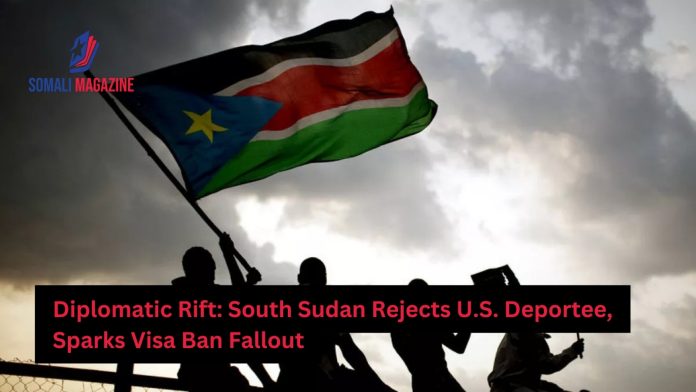Facebook Twitter Instagram Somali Magazine - People's Magazine
South Sudan has disowned a man deported from the United States, claiming he is not a citizen of the country, in a move that has triggered diplomatic tensions and sweeping visa bans for South Sudanese nationals. The incident, which unfolded on April 5, 2025, at Juba International Airport, has raised questions about immigration protocols and the consequences of misidentification in deportation cases.
The individual, identified as Makula Kintu, arrived in Juba with travel documents under the name Nimeri Garang, allegedly issued by South Sudanese authorities. However, upon investigation, South Sudanese officials determined that Kintu was a Congolese national from the Ema tribe in North Kivu Province, Democratic Republic of Congo (DRC). The government stated that “comprehensive verification processes” confirmed his Congolese nationality, prompting authorities to deny him entry and return him to the United States.
South Sudan’s Foreign Affairs Ministry expressed regret over the incident, emphasizing that the deportee was not a South Sudanese citizen and accusing the U.S. of misrepresentation. “In accordance with our immigration protocols, we returned him to the sending country for further processing,” said ministry spokesperson Apuk Ayuel Mayen. The ministry also noted that its embassy in Washington had processed emergency travel documents for 21 of the 23 individuals flagged for deportation by U.S. authorities, with Kintu and another individual later identified as Sudanese being exceptions.
The U.S. State Department responded swiftly, announcing the immediate revocation of all visas held by South Sudanese passport holders and halting further issuance. Secretary of State Marco Rubio cited South Sudan’s “failure to accept the return of its repatriated citizens in a timely manner” as the reason for the blanket visa ban. Rubio added that the ban would be reviewed once South Sudan demonstrated full cooperation in deportation matters.
The visa revocation has sparked outrage among South Sudanese officials, who argue that the decision was based on an isolated case of misrepresentation by a non-South Sudanese national. “The government deeply regrets that, despite its longstanding cooperation and partnership with U.S. authorities, South Sudan now faces widespread visa revocations due to an isolated incident,” the Foreign Affairs Ministry stated.

The incident has also drawn criticism from human rights organizations, which have raised concerns about the broader implications of the visa ban. Activists warn that the measure could disproportionately affect South Sudanese nationals seeking asylum or pursuing educational opportunities in the U.S. “This blanket ban punishes innocent individuals for a bureaucratic error. It undermines the principles of fairness and due process,” said a representative from Amnesty International.
The diplomatic fallout comes at a time of heightened tensions between South Sudan and the U.S., with Washington expressing frustration over Juba’s handling of deportation cases. The incident has also reignited debates about the challenges of verifying nationality in deportation processes, particularly in regions with porous borders and complex identity dynamics.
South Sudan’s Information Minister Michael Makuei Lueth defended the government’s actions, stating that no sovereign nation would accept foreign deportees without proper verification. “We welcome all our citizens, whether they are returning voluntarily or through deportation processes. However, we cannot accept individuals who are not South Sudanese,” Lueth said.
As the situation unfolds, both nations face mounting pressure to resolve the diplomatic standoff and address the underlying issues in their immigration protocols. The incident serves as a reminder of the complexities of deportation cases and the importance of accurate identification in maintaining international relations.

